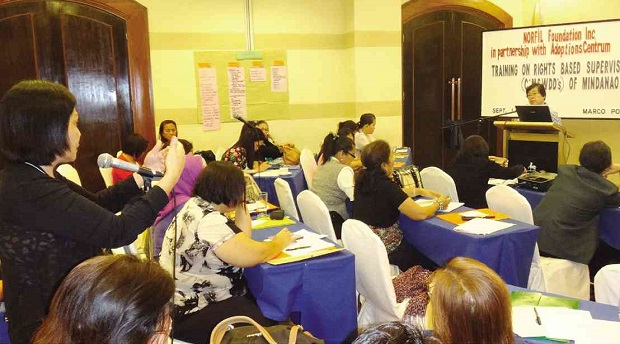Breaking the child-trafficking cycle

GENERAL Santos City social welfare officer Rebecca Magante shares recent experiences in handling child-trafficking cases. MA. CECILIA RODRIGUEZ/CONTRIBUTOR
GENERAL SANTOS CITY, Philippines—It was the accidental discovery of a child-trafficking syndicate in General Santos City that made chief social worker Rebecca Magante think deeply about the urgency of her duty.
On Aug. 13, two girls, ages 11 and 16 years, were rescued by agents of the Presidential Anti-Organized Crime Commission from a bar owned by Harrold Ronald Paddock, an American, and his Filipino partner, Estela Cortes, in the village of Lagao.
Magante, who heads the City Social Welfare and Development Office and was among the first persons to speak with the two girls, was disheartened by the fact that they did not express any regret in living with Paddock.
“For three years since they were ‘adopted’ in 2011, they were well-fed, clothed and educated in a private school, and were given everything they wanted in exchange for sex,” she recounted the girls as saying.
Wake-up call
According to Magante, the families of the victims knew who Paddock was but never refused when he asked if he could adopt the girls. They described Paddock as a wealthy American offering help to save the girls from poverty.
Magante could only shake her head and grimace. “I was asking myself if we could have prevented this from happening. How could this kind of syndicate thrive in our city, or even in our country?” she asked.
The arrest of Paddock and Cortes opened new leads to what authorities believe is a deeply embedded child-trafficking syndicate in the country. It turned out that Paddock had been to many parts of Mindanao and had taken in at least eight more girls in Davao City and an unknown number in Cagayan de Oro City.
With Paddock’s arrest in General Santos, Magante said the issue might put the city in a bad light, but that it was also a wake-up call for the Department of Social Welfare and Development and the local government unit (LGU) to give more emphasis on protecting children’s rights.
“We should no longer be complacent and instead take a proactive stance in stopping child trafficking. But where should we start?” she said.
As if listening to Magante’s thoughts, the Norwegian-Filipino Foundation (NorFil), a local nongovernment organization advocating children’s rights, organized a training on rights-based supervision, which aimed to help LGUs and social workers in Mindanao understand children’s issues and problems and come up with solutions.
First step
Magante viewed the training as the first step in addressing child trafficking in the city: orient social workers on existing laws on child protection and enable them to proactively enforce these laws.
“The biggest contingent came from GenSan because I brought everybody in my department,” Magante said.
Ma. Teresa Nuqui, NorFil executive director, cited the importance of building the capacity of the community and the frontline social workers in protecting the rights and welfare of children.
“Every child has a right to a name, to receive proper care and to be nurtured by a family,” Nuqui stressed, as she noted that many of those who fall prey to child trafficking are abandoned children.
For 30 years, NorFil has been at the forefront of community-based rehabilitation for disabled, as well as neglected or abandoned, children.
According to Nuqui, her organization has a lot of best practices that it wants to share with government social workers who are duty-bound to protect children in the community.
“There are also newly issued laws on children that need to be disseminated and properly adhered to or enforced by duty-bearers,” she said.
Breaking the cycle
Magante said now is the time to go beyond the campaign against child trafficking by delving into the root cause.
“All agencies and the community should work together. For example, we could work with the National Statistics Office in getting the exact names and whereabouts of children in one particular community to ensure all children are accounted for and are in the care of their own family,” she said.
One of the ways child-trafficking syndicates operate, which Magante and her team discovered after Paddock’s arrest, is that they would adopt babies from poor families and pay middle-aged women to care for them until they reach 6 years old or old enough to be traded to pedophiles.
“It’s a sick and vicious cycle, and we need to do everything now to break it,” Magante said.
Nuqui added: “It is the responsibility of the community to help the parents or the family in nurturing the child and to ensure that the rights of every child are protected and fulfilled.”